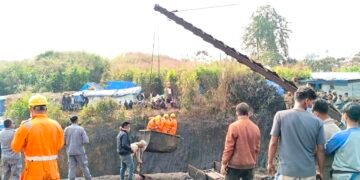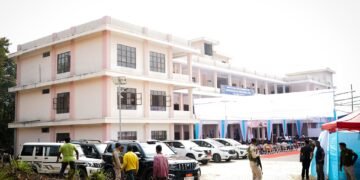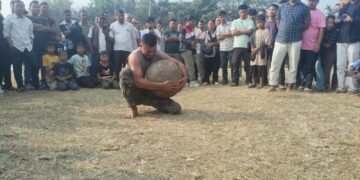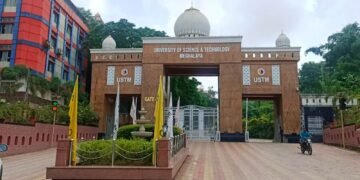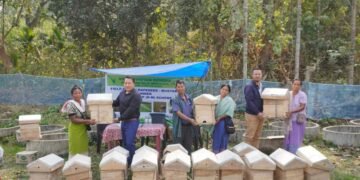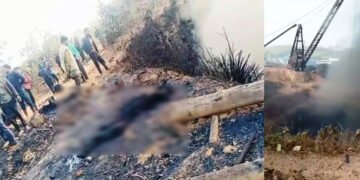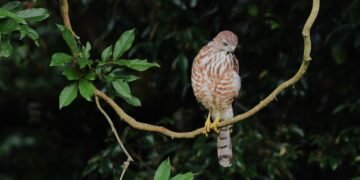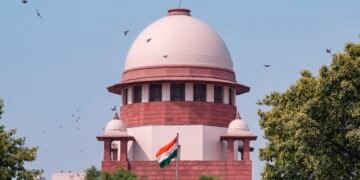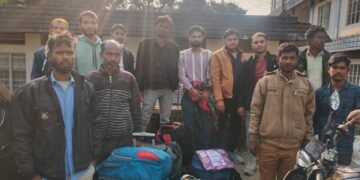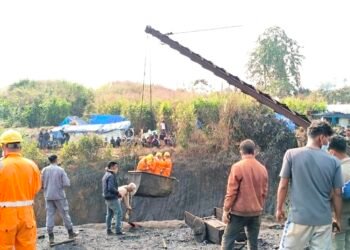The Central Ground Water Board (CGWB), State Unit Office, Shillong organised a Tier-III training program on “Ground Water Development and Management Practices” at North Eastern Hill University (NEHU) today.
The event, held at the Social Science Cluster Classrooms, Department of Geology, aims to enhance understanding and management of groundwater resources among key stakeholders.
Dean of the School of Human and Environmental Sciences (SHES) Prof. Devesh Walia who attended the programme as the chief guest, emphasised the crucial role of water in sustaining life and making Earth unique. He spoke about the seasonal water scarcity in Meghalaya and the growing need to protect groundwater, a vital yet finite resource, particularly as surface water sources are more susceptible to pollution.
Walia urged collective responsibility among stakeholders and reassured that government support is available for dedicated initiatives in groundwater management and also highlighted the impact of various government schemes on groundwater management.
Assistant Professor and teacher-in-charge of the Geology Department, Dr Ravi Ranjan Kumar underscored the essential role of groundwater in daily life, especially given India’s diverse terrain. He acknowledged central and state initiatives such as the ‘Atal Bhujal Yojana,’ ‘Pradhan Mantri Krishi Sinchai Yojana,’ and many more; which aim to improve groundwater recharge and rainwater harvesting. He expressed hope that the program would advance knowledge among participants.
In her presidential address, Scientist-D & Head of Office, CGWB, SUO, D. Rabha highlighted the three-tier structure of the groundwater training program—National, State, and Grassroots levels. She emphasized the importance of grassroots engagement, as it directly involves local stakeholders in water management.
Rabha pointed out that groundwater, generally less polluted than surface water, requires careful management, and noted the CGWB’s ongoing efforts to train individuals across these levels.
The technical sessions featured key presentations by experts from CGWB. Ankita Borah, Young Professional, introduced the fundamentals of hydrogeology, followed by Shasinlo Kent, Scientist-C, who spoke on the hydrogeology and springs of Meghalaya.
Anenuo Pienyu, Scientist-C, provided insights into rainwater harvesting and artificial recharge methods, while Rabha discussed groundwater quality and its impact on human health.
Concluding the technical presentations, Rinku Rani Das explored the application of stable isotopes in groundwater studies.
Following the technical sessions, there were field visits to key sites, including a monitoring station at Golf Link, spring site visit at Umshing-Umjapung and a rainwater harvesting site at the residence of Nathanael Newmai in Mawdiangdiang.
These visits aim to provide hands-on experience in water resource management practices and showcase sustainable approaches to groundwater development and conservation.
A certificate of appreciation was also handed over to Newmai by the Central Ground Water Board in recognition of his outstanding commitment to water conservation through the innovative practice of constructing rooftop rainwater harvesting system and dedication to sustainable living and complete reliance on this vital resource demonstrates a remarkable commitment to environmental stewardship.

